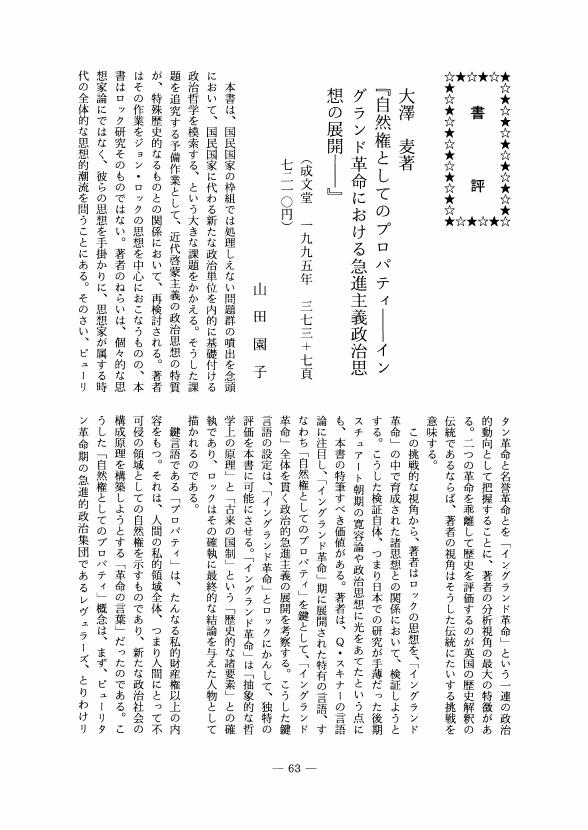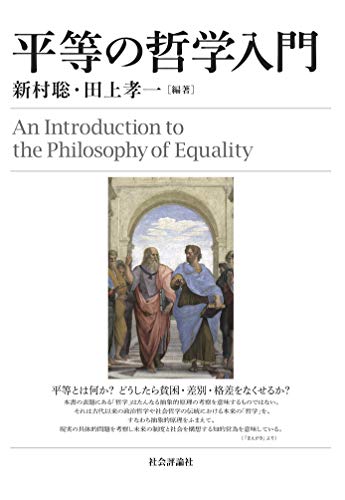- 著者
- 新村 聡
- 出版者
- 経済理論学会
- 雑誌
- 季刊経済理論 (ISSN:18825184)
- 巻号頁・発行日
- vol.43, no.1, pp.26-35, 2006-04-20 (Released:2017-04-25)
This paper considers different concepts of equality and inequality in neo-liberalism and welfare states. The equality in neo-liberalism or libertarianism is based on the two principles, that is, the principle of "distribution in proportion to desert," and that of "burden in proportion to benefit." We call them "the market principles" in this paper. On the other hand, the equality in welfare states is based on the different two principles, the principle of "distribution in proportion to needs," and that of "burden in proportion to ability." We call them "the community principle." Karl Marx distinguished the works principle (a kind of the principle of distribution in proportion to desert) and the needs principle in his Critique of the Gotha Programme. He expected that the works principle would prevail in the first stage of a communist society and the needs principle would do in the second and highly developed one. Amarthya Sen pointed that the needs principle had been involved in the social security and other social services in welfare states. This paper argues that the community principles, including the needs principle and the principle of burden in proportion to ability, are more or less prevailing not only in welfare states but also in various communities such as families, local communities, companies, religious organizations, nation states, and international organizations.
2 0 0 0 OA 経済思想史における人口・貧困・福祉:国際比較研究
経済学の歴史において、人口は国民の貧困や福祉に重大な影響を与える要因として、常に注目されていた。本研究ではこの視点を各国比較の参照枠として捉え、フランス、イタリア、インドなどを具体的に取りあげた。その結果、現在の経済学では所与と捉えがちな人口という条件が、人々の生活(つまり貧困や福祉)にいかに影響を与え続けてきたか、という歴史的な教訓を再確認することができた。科研費メンバーはそれぞれ、リヨン(フランス)、サレント(イタリア)など各地に赴き、現地の研究者と交流することで、今後、この論題を発展する手がかりをつかむこともできた。
1 0 0 0 OA 書評
1 0 0 0 OA 書評
- 著者
- 新村聡 田上孝一編著
- 出版者
- 社会評論社
- 巻号頁・発行日
- 2021
1 0 0 0 OA 正義論におけるヒュームとスミス
- 著者
- 新村 聡
- 出版者
- 日本イギリス哲学会
- 雑誌
- イギリス哲学研究 (ISSN:03877450)
- 巻号頁・発行日
- vol.4, pp.25-34, 1981-03-28 (Released:2018-06-25)
1 0 0 0 OA 星野彰男『アダム・スミスの経済理論』関東学院大学出版会, 2010年, xi+217頁
- 著者
- 新村 聡
- 出版者
- 経済学史学会
- 雑誌
- 経済学史研究 (ISSN:18803164)
- 巻号頁・発行日
- vol.53, no.2, pp.128-129, 2012 (Released:2019-10-31)
- 著者
- 新村 聡
- 出版者
- The Japanease Society for the History of Economic Thought
- 雑誌
- 経済学史研究 (ISSN:18803164)
- 巻号頁・発行日
- vol.48, no.1, pp.175-176, 2006-06-30 (Released:2010-08-05)
- 著者
- 新村 聡
- 出版者
- 経済学史学会
- 雑誌
- 経済学史学会年報 (ISSN:04534786)
- 巻号頁・発行日
- vol.43, no.43, pp.110-111, 2003 (Released:2010-08-05)
1 0 0 0 OA 田中正司『アダム・スミスと現代』御茶の水書房, 2000, ix+207+5p.
- 著者
- 新村 聡
- 出版者
- 経済学史学会
- 雑誌
- 経済学史学会年報 (ISSN:04534786)
- 巻号頁・発行日
- vol.40, no.40, pp.96-97, 2001 (Released:2010-08-05)
- 著者
- 新村 聡
- 出版者
- The Japanese Society for the History of Economic Thought
- 雑誌
- 経済学史学会年報 (ISSN:04534786)
- 巻号頁・発行日
- vol.31, no.31, pp.138-139, 1993 (Released:2010-08-05)
1 0 0 0 OA 羽鳥卓也『「国富論」研究』, 未来社, 1990, 247 p.
- 著者
- 新村 聡
- 出版者
- 経済学史学会
- 雑誌
- 経済学史学会年報 (ISSN:04534786)
- 巻号頁・発行日
- vol.29, no.29, pp.42, 1991 (Released:2010-08-05)
- 著者
- 新村 聡
- 出版者
- 岡山大学経済学会
- 雑誌
- 岡山大学経済学会雑誌 (ISSN:24334146)
- 巻号頁・発行日
- vol.49, no.2, pp.1-15, 2018-02-26
Adam Smith is well known as an archetypal, leading economist and advocate of laissez-faire capitalism. In fact, Smith analyses the autonomous mechanism of a market economy, criticises mercantile protection, and strongly advocates a free trade policy. However, a considerable number of Smith's interpreters such as J.Viner have recognised that Smith himself offers many exceptions to laissez-faire. Interestingly, most of the exceptions are not presented in Lectures on Jurisprudence( LJ); they appear for the first time in The Wealth of Nations( WN). Rather than inconsistencies in the passing, these references seem to reflect a conscious shift in Smith's policy principle from laissez-faire with a small government to state intervention under a big government. In WN, Smith maintains support for the laissez-faire approach only in the area of foreign trade, and prescribes state intervention in other areas such as banking, financial markets, public works and institutions, and taxation. This article focuses particularly on the evolution of Smith's view on taxation from LJ to WN. Smith insists in LJ that taxation should be minimised so as not to interfere with the behaviour of various economic agents and the autonomous mechanism of a market economy. However, Smith renounces his fundamental idea of taxation in WN, which indicates support for the imposition of heavier taxes on the rich and reduced taxes on the poor. He proposes an increase in land tax and rejects taxes on profit and wages. He favours various types of progressive taxes and criticises regressive ones, concerning land, houses, and toll, among others. Notably, Smith strongly supports various kinds of "taxes upon the capital value of lands, houses and stock" such as succession tax, land tax, house-rent tax and" stampduties and duties of registration" indirectly taxed on interest.
1 0 0 0 書評
- 著者
- 新村 聡
- 出版者
- 経済理論学会
- 雑誌
- 季刊経済理論 (ISSN:18825184)
- 巻号頁・発行日
- vol.43, no.1, pp.26-35, 2006
This paper considers different concepts of equality and inequality in neo-liberalism and welfare states. The equality in neo-liberalism or libertarianism is based on the two principles, that is, the principle of "distribution in proportion to desert," and that of "burden in proportion to benefit." We call them "the market principles" in this paper. On the other hand, the equality in welfare states is based on the different two principles, the principle of "distribution in proportion to needs," and that of "burden in proportion to ability." We call them "the community principle." Karl Marx distinguished the works principle (a kind of the principle of distribution in proportion to desert) and the needs principle in his Critique of the Gotha Programme. He expected that the works principle would prevail in the first stage of a communist society and the needs principle would do in the second and highly developed one. Amarthya Sen pointed that the needs principle had been involved in the social security and other social services in welfare states. This paper argues that the community principles, including the needs principle and the principle of burden in proportion to ability, are more or less prevailing not only in welfare states but also in various communities such as families, local communities, companies, religious organizations, nation states, and international organizations.
1 0 0 0 IR アダム・スミスの平等論と分配的正義論 (服部正治教授記念号)
- 著者
- 新村 聡 ニイムラ サトシ Satoshi Niimura
- 出版者
- 立教大学経済学研究会
- 雑誌
- 立教経済学研究 (ISSN:00355356)
- 巻号頁・発行日
- vol.69, no.4, pp.49-67, 2016-02
1 0 0 0 近代自然法学とアダム・スミスの経済理論および国家論の比較研究
近代自然法学の国家論の中心をなす社会契約説は、市民政府の起源と忠誠義務の根拠を、契約・合意・同意などから説明した。この社会契約説を批判したのが、デヴィッド・ヒュームとアダム・スミスである。本研究は、ヒュームが、市民政府の起源について原始契約の存在を認めた上で、忠誠義務の根拠を契約に求める見解を批判して利害と慣習から説明したことを示した。さらにスミスが、ヒューム理論を継承発展させた「権威の原理」と「功利の原理」の理論によって市民政府の起源と服従の根拠を説明し、社会契約説への理論的批判を完結させたことを明らかにした。日本では、近年自然法思想およびヒューム、スミスらの思想はしばしば「市民社会論」と呼ばれてきた。本研究は、日本における市民社会論の歴史についても考察した。近代自然法学および重商主義の経済理論を特徴づけるのは、貨幣数量説である。ヒューは、貨幣数量説を国際的金移動の理論と結合して、重商主義の貿易規制策を批判する一方、連続影響説より貨幣数量が産出量水準にも影響を及ぼすことを認めた。本研究は、アダム・スミスが、『法学講義』で貨幣数量説と異なる銀価決定論を述べており、『国富論』では、銀価の変動を歴史的に考察する一方で、ステュアートの理論的影響のもとに流通必要量説を主張し、貨幣数量説と異なる見解を展開したことなどを明らかにした。









